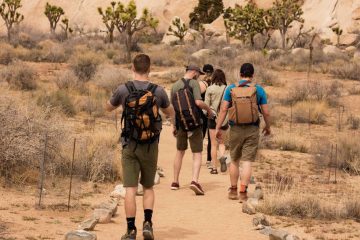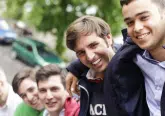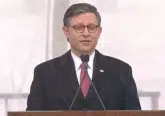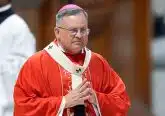From Italian coast to U.S. desert, church leaders weigh in for migrants
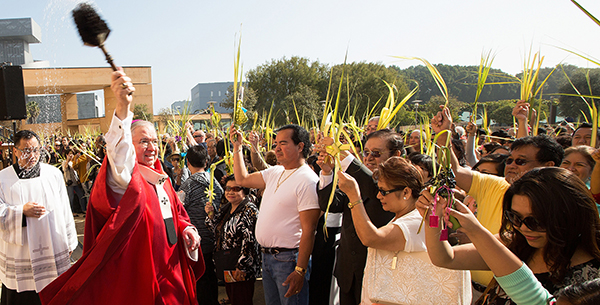
By Patricia Zapor Catholic News Service
WASHINGTON (CNS) — As pressure to pass an immigration reform bill shifted to the House of Representatives in July, the voices speaking out for more humane treatment of migrants included Pope Francis and former President George W. Bush.
Scores of advocates for comprehensive immigration reform swarmed over Capitol Hill day after day, visiting congressional offices and staging events such as a mock naturalization ceremony for would-be citizens who are currently in immigration limbo.
President Barack Obama met with the Congressional Hispanic Caucus one day and the next with two key senators, John McCain, R-Ariz., and Charles Schumer, D-N.Y. Both times the conversation was primarily about immigration reform, which Obama has made a high priority.
Meanwhile, a closed-door caucus of House Republicans July 10 was reported to have underscored just how the path to a comprehensive bill is overgrown with conflicting political interests.
House Republicans gave reporters varied versions of what they took away from the session.
House Speaker John Boehner of Ohio said the majority of his party’s caucus members agree they need to address immigration, but that they prefer to do it piece-by-piece, focusing first on enforcement measures, rather than take up the comprehensive bill the Senate passed. Other Republicans said that while they want enforcement to come first, they might accept the legalization and citizenship path.
Still others, including Rep. Steve King of Iowa, were sticking to the notion that any path to legalization, even for people brought in as children who have no ties to another country, would destroy “the rule of law,” as The New York Times reported. The Times said King conceded that support for his point in the caucus session was weaker than it has been in the past.
Backers of comprehensive reform, including the U.S. Conference of Catholic Bishops, a coalition of evangelicals and other faith groups argue that only by dealing with all the pieces of immigration — border enforcement, legalization, fixes to the process for bringing in workers and family members and changes to requirements for verifying employee immigration status — will any part of it work.
Meanwhile, Bush, in a rare public appearance in which he referenced public policy, at a naturalization ceremony urged Congress to take a broad approach to reform. He advocated for comprehensive reform when he was president.
In June, the Senate voted 68-32 for a bill that includes billions of dollars of new spending on border security and addresses a wide range of problems in the current systems, including: family immigration; various types of worker visas; and legal status for people who were brought to the U.S. as children. It includes a 13-year path to citizenship for many of the estimated 11 million immigrants who lack permission to be in the country. They would be required to speak English, pay fines and any taxes owed and meet other benchmarks.
Boehner and King, both Catholics, are among members of the House being targeted by a campaign set for the week of July 15. Dozens of Catholic university presidents planned to directly appeal to Catholics in the House to draw moral courage from their faith in supporting broad-based reform.
Those who ground their appeals for immigration reform in the teachings of Christianity about migrants got a timely and photogenic boost from Pope Francis July 8, as he visited Lampedusa, an Italian island where immigrants who try to reach Europe by sea are detained. He said he was moved to make the trip after he saw news stories describing the drowning of immigrants at sea.
“Those boats, instead of being a means of hope, were a means of death,” he said.
In a homily given from a lectern built out of the hull and wheel of boats, the pope said he chose to make the Mass a penitential liturgy to “ask forgiveness for our indifference toward so many brothers and sisters” and for the ways in which well-being has “anesthetized our hearts.”
The pope prayed for the forgiveness of “those, who with their decisions at the global level, have created situations that lead to these tragedies.”
A couple of days later, Los Angeles Archbishop Jose H. Gomez compared those migrants lost at sea to those who die trying to start new lives in the United States by crossing the the border illegally.
In a statement, the chairman of the U.S. bishops’ Committee on Migration said comprehensive reform of immigration laws in the U.S. would relieve the suffering of human beings, including due to “the separation of families, the exploitation of migrant workers and the death of our fellow human beings in the American desert.”
Archbishop Gomez called on the House to pass “just and humane” immigration reform, adding that “the current immigration system, which causes so much human suffering, is a stain on the soul of our nation.”
At a Social Action Summer Institute in Tucson, Ariz., a few weeks earlier, employees of Catholic parishes, dioceses and charitable organizations heard Holy Cross Father Daniel Groody, a theology professor at the University of Notre Dame, provide the theological context for the church’s position on immigration.
Father Groody, who directs the Center for Latino Spirituality and Culture at the university’s Institute for Latino Studies, spent many years doing pastoral work and research in Latin America and along the U.S.-Mexican border, particularly in the Coachella Valley of California.
He detailed the church’s immigration-related teachings dating back to St. Thomas Aquinas’ discussion of the kinds of rights people have, including the need to care for one’s family and those defined in civil law.
The oft-voiced argument by proponents of harsh enforcement, “what part of illegal don’t you understand,” is “a great argument that has nothing to do with reality,” Father Groody said, as he went on to detail ways in which God-given rights justifiably trump those of civil society.







